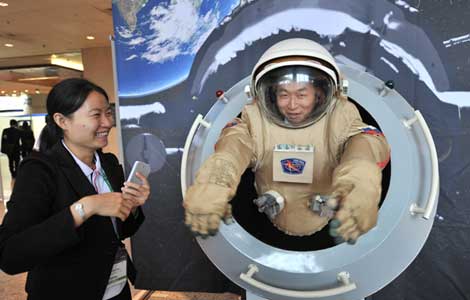China-US college venture focuses on public health
Updated: 2013-09-24 01:12
By WANG HONGYI (China Daily)
|
||||||||
Duke Kunshan University, a new China-US joint venture, is to establish a global health research institute to study China's public health issues in a global perspective.
The Ministry of Education formally approved the college, formed by Duke and Wuhan University and located in Kunshan, Jiangsu province, on Sept 12.
DKU will offer degree and nondegree academic programs for students from China and around the world. The first batch of students will start in the fall next year.
"In recent years, public health issues have gained more attention, and many world class universities have carried out research in the field," Liu Jingnan, chancellor of DKU, a former president of Wuhan University and a member of the Chinese Academy of Engineering, said at a news conference on Tuesday.
"The Global Health Institute of DKU will carry out research based on the Chinese population, and focus on the study of diseases such as infectious diseases, chronic diseases and their influence on social economy."
He also announced the new college's first master's degree programs, in science in global health, science in medical physics and management studies.
The master's in science in global health is a new approach to learning how to prevent disease, as well as the social, economic, political and environmental causes of disease, and effective strategies to increase equity among the world's rich and poor, Liu said.
Global health is complex and requires the involvement of experts from multiple and diverse disciplines, he explained, adding that the master's program has been modeled on the highly successful program pioneered at Duke University.
"With the deepening of globalization, more public health problems have transcended national borders," said Fu Hua, a professor with Fudan University's School of Public Health. "Many issues should be discussed in a global context, which needs more worldwide involvement.
"Over the years, many domestic experts have been implementing studies with overseas institutes, which will better leverage the global resources. The global health study of DKU is expected to work as a bridge bringing more advanced thoughts and study concepts to China."
The new college said additional graduate degree programs are now being developed, and each will lead to Duke University degrees.
Unlike Shanghai New York University, the first China-US joint venture, created by East China Normal University and New York University, DKU will open bachelor's degree programs years later.
"Education for undergraduates will focus on the liberal arts education, which need the support of many disciplines," Liu said. "We can't introduce so many disciplines in a short time.''
So far, DKU has started its enrollment work for the 2014 academic year. The application process will be the same as for those applying for universities in the United States. Students should summit a personal statement, recommendation letters and GRE scores.
According to DKU, the number of students for master's degree programs will not exceed 100, with Chinese students and international students each accounting for 50 percent.
For undergraduate students enrolled at other universities in China and around the world, the DKU Undergraduate Global Learning Semester will provide them with the opportunity to study at DKU and earn Duke University credit across several disciplines.
Nondegree undergraduate courses in global health, humanities, physical and natural sciences, and social sciences are planned for the 2014-15 academic year.
More than 50 faculty members from Duke University will teach at DKU during its first two years, and all DKU programs are expected to deliver world-class educational experiences, said Peter Lange, Duke's provost and chair of the DKU board of trustees.
Most Viewed
Editor's Picks

|

|

|

|

|

|
Today's Top News
China announces pricing policy for fuel upgrade
Microsoft to set up Chinese joint venture
China to increase rare earth purchase
Maduro aims to build trade plan with China
Sino-US college venture focuses on public health
Shanghai regulates govt-funded overseas training
Hong Kong kungfu drama to compete for Oscar
China to help deal with chemical weapons
US Weekly

|

|













